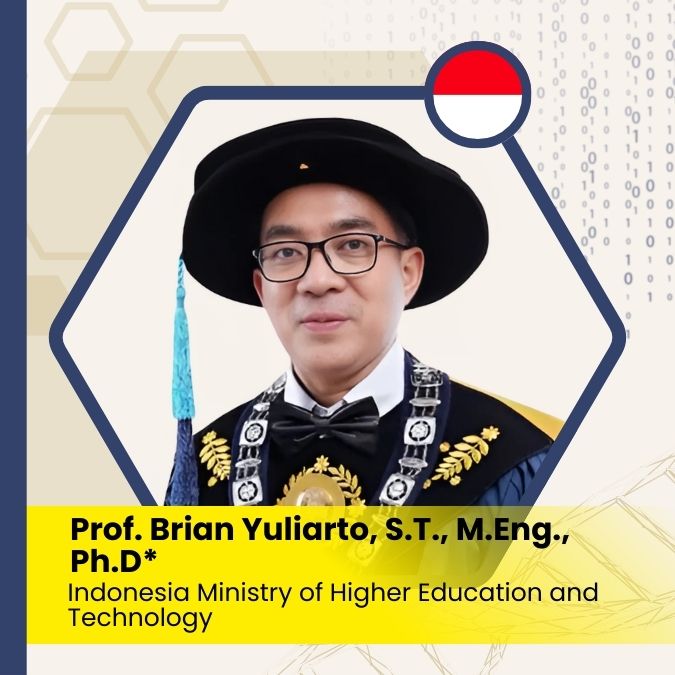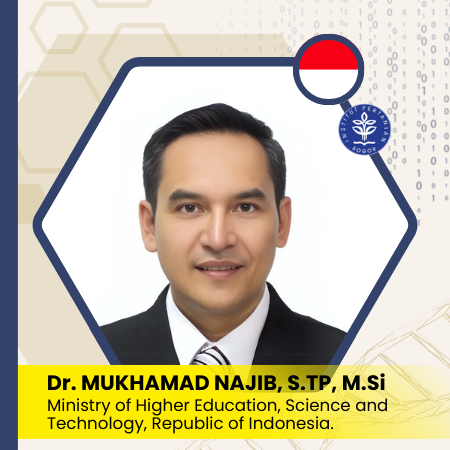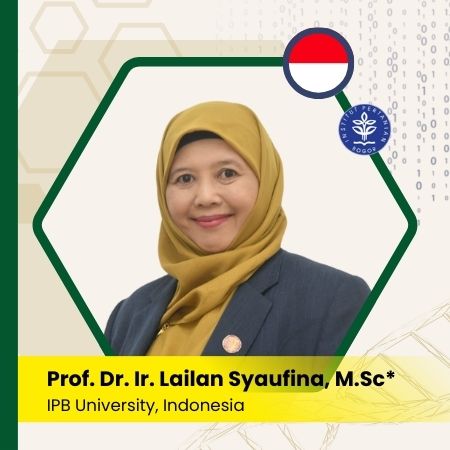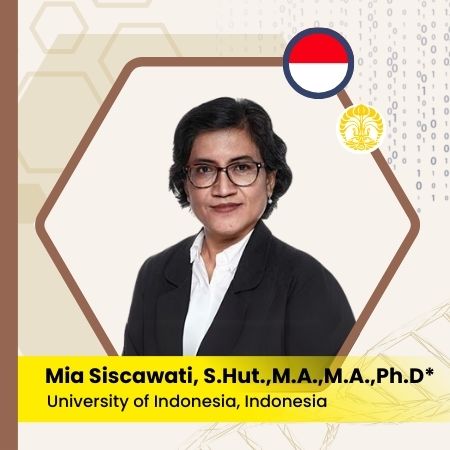IMPORTANT DATES:
• Abstract Submission:
1 March - 31 March 2025 19 April 2025
• Pre-Conference:
15 & 29 April 2025
• Abstract Acceptance Notification:
05 April 2025 22 April 2025
• Registration and Full Payment:
14 March – 08 May 2025
• Media Submission:
14 March – 08 May 2025
• Online Conference:
22 – 23 May 2025
• Post-Conference:
31 May 2025
• Full Paper Submission:
23 May - 07 June 2025
• Scopus Proceeding Submission:
07 July 2025
Archives
-

Bioresources in Food and Nutrition for a Healthier Future
2025"Bioresources in Food and Nutrition for a Healthier Future" offers a forward-thinking approach to using natural resources to meet the increasing global demand for nutritious and sustainable food. This subtheme combines principles of biodiversity conservation, bioeconomy, and nutritional science to drive innovation in food production, improve dietary diversity, and enhance human health and well-being.
At its heart, this subtheme recognizes the value of biological resources, including plants, animals, microorganisms, and marine life, as key elements of the food system. It focuses on managing and using these resources sustainably to ensure their long-term availability while fulfilling the nutritional needs of a growing global population.
Central to this approach is the bioeconomy, which aims to maximize the value of biological resources through advanced technologies and processes. From bioprospecting and genetic engineering to biorefining and utilizing by-products, bioresources are creatively used to produce value-added food products, ingredients, and supplements that support health and nutrition.
This subtheme also highlights the critical role of biodiversity in ensuring food and nutrition security. By promoting the conservation of diverse ecosystems and the genetic variety of crops, livestock, and aquatic species, it helps strengthen the resilience of the food system against environmental threats and guarantees access to a broad range of nutrient-rich foods.
In nutrition, bioresources are vital in combating malnutrition and diet-related health issues by offering a variety of nutrient-dense foods and functional ingredients. This includes incorporating underutilized food crops, traditional foods, and wild-harvested species into diets, along with developing fortified foods and bioactive compounds to address specific nutritional needs.
Furthermore, this subtheme emphasizes the interconnectedness of food systems, human health, environmental sustainability, and socio-economic development. It underscores the importance of interdisciplinary approaches that address the complex relationships between food production, consumption, and health outcomes, as well as the cultural and social aspects of food.
In conclusion, Bioresources in Food and Nutrition for a Healthier Future represents a comprehensive approach to transforming food systems, grounded in sustainability, equity, and resilience. By tapping into the potential of biological resources and fostering innovation throughout the food value chain, it aims to create a healthier, more sustainable future for all.
-

Innovative Technologies in Bioresource Science and Engineering
2025"Innovative Technologies in Bioresource Science and Engineering" represents a transformative approach to the use of biological resources, integrating advanced technologies to unlock their potential for sustainable development, environmental conservation, and human well-being. This subtheme combines knowledge from biology, engineering, and materials science to develop innovative solutions for resource management, value creation, and industrial applications.
At its core, this subtheme focuses on harnessing the potential of nature’s resources such as plants, microorganisms, marine organisms, and agricultural by-products through engineering and innovation. It encompasses a wide range of technologies aimed at converting raw bioresources into high-value products, processes, and materials that benefit both society and the environment.
One of the central elements is bioprocessing, which converts biological materials into valuable products using biochemical or microbial processes. Techniques such as fermentation and enzymatic conversion enable the production of biofuels, biochemicals, biopolymers, and pharmaceuticals from renewable resources, reducing reliance on fossil fuels and minimizing environmental impact.
Biotechnology is crucial in unlocking the potential of bioresources, offering tools for genetic and metabolic engineering to enhance the productivity and resilience of biological systems. From gene editing to microbial synthesis, these advancements improve crops, develop bioremediation solutions, and optimize industrial processes.
This subtheme also includes advanced materials science, focusing on biocomposite materials and bio-inspired designs. By using biological substances like cellulose and lignin, sustainable alternatives to conventional materials can be created, reducing the environmental footprint of non-renewable resources.
In the field of environmental engineering, bioresource science is applied to waste management, pollution control, and ecosystem restoration. Techniques such as bioremediation and biofiltration use the natural abilities of microorganisms and plants to detoxify polluted environments and restore ecological balance.
Additionally, this subtheme explores the integration of bioresource science with emerging fields such as synthetic biology, nanotechnology, and artificial intelligence, leading to more precise, efficient, and impactful bioengineering applications.
In conclusion, Innovative Technologies in Bioresource Science and Engineering represents a frontier where biological resources and human ingenuity intersect to offer solutions to global challenges, paving the way for sustainable development and prosperity.
-

Socio-economics and Business Transformation in Tropical Bioresources
2025"Socio-economics and Business Transformation in Tropical Bioresources" explores the intersection of sustainable development, social well-being, and economic innovation in managing tropical biological resources. This subtheme highlights the essential role of tropical bioresources in supporting local economies, providing livelihoods, and enhancing food security through sectors such as agriculture, forestry, fisheries, and ecotourism.
It emphasizes the need for inclusive and equitable management of these resources, addressing challenges such as deforestation, climate change, and land degradation. The transformation of business models in this context involves promoting sustainable practices, ethical value chains, and community-based enterprises that balance economic growth with environmental integrity.
Innovation and entrepreneurship are also central to this subtheme, encouraging the development of bio-based products and services by combining traditional knowledge with modern science. These efforts aim to empower local communities, foster social justice, and create resilient economies rooted in the rich biodiversity of tropical regions.
By promoting participatory approaches and collaboration among stakeholders, this subtheme seeks to ensure that tropical bioresources are managed sustainably and contribute to long-term, inclusive development.
-

Agriculture, Animal Sciences, Agroforestry, and Agromaritime Innovation
2025The subtheme of Agriculture, Animal Sciences, Agroforestry, and Agromaritime Innovation reflects a comprehensive and integrated approach to sustainable food production and environmental stewardship. It brings together traditional knowledge and modern technologies to improve agricultural efficiency, support ecosystem health, and promote socio-economic development.
Agriculture remains the foundation, encompassing crop cultivation and livestock management aimed at increasing productivity while reducing ecological impact. Animal Sciences contribute by enhancing animal health, welfare, and breeding through advances in genetics, nutrition, and veterinary science.
Agroforestry introduces a synergistic model by integrating trees into farming systems to enrich biodiversity, prevent soil degradation, and improve climate resilience. Meanwhile, Agromaritime Innovation expands agricultural practices into marine and coastal areas, utilizing aquaculture, seaweed farming, and other blue economy initiatives to address food security and environmental challenges.
Together, these areas represent a unified vision for transforming food systems through sustainable, innovative, and inclusive practices that balance human needs with ecological responsibility.
-

Program Book: General Information
2025The 2nd International Seminars on Tropical Bioresources Advancement and Technology (ISOTOBAT 2025) is a ground-breaking event exploring emerging science, innovation and technology in fostering future sustainable environments. This premier event is dedicated to advancing knowledge and understanding of tropical bioresources across various sectors including agriculture, forestry, marine, and animal sciences. The conference is designed as a multidisciplinary platform for experts, researchers, students, and enthusiasts to share insights and foster collaborations towards a sustainable and healthier future. This seminar focuses on promoting sustainable innovation for the management of tropical bioresources in the digital era, exploring new strategies and technologies to enhance resource efficiency, environmental conservation, and economic development.
ISOTOBAT 2025 carries the theme "Sustainable Innovation for Tropical Bioresources Management in the Digital Era". The seminars will encompass four critical sub-themes, each addressing different facets of tropical bioresources: Agriculture, Animal Sciences, Agroforestry, and Agromaritime Innovation, Socio-economics and Business Transformation in Tropical Bioresources, Innovative Technologies in Bioresource Science and Engineering, and Bioresources in Food and Nutrition for a Healthier Future. ISOTOBAT 2025 aims to attract more than 200 paper submissions, with international contributions projected to reach 30%. The accepted articles will be published in the Scopus-indexed proceeding in the BIO Web of Conferences.

This work is licensed under a Creative Common Attribution-Author 4.0 International License.
This license enables reusers to distribute, remix, adapt, and build upon the material in any medium or format, so long as attribution is given to the creator. The license allows for commercial use.
-

Agriculture, Animal Sciences, Agroforestry, and Agromaritime Innovation
2024The subtheme of Agriculture, Animal Sciences, Agroforestry, and Agromaritime Innovation encapsulates a multifaceted realm of human endeavor, intertwining traditional practices with cutting-edge technological advancements to enhance sustainable food production, promote environmental stewardship, and foster socio-economic development. At its core, this subtheme represents the intersection of human ingenuity with the natural world, where innovation meets tradition to cultivate a harmonious relationship between humanity and the earth.
Agriculture, the cornerstone of civilization, forms the backbone of this subtheme, encompassing the cultivation of crops, livestock management, and agricultural practices aimed at optimizing yields while minimizing environmental impact. From ancient agricultural methods rooted in millennia of tradition to modern precision farming techniques driven by data analytics and automation, this subtheme spans the spectrum of agricultural innovation.
Animal Sciences delve into the intricate study of domesticated animals, exploring their biology, behavior, and welfare to improve breeding strategies, enhance productivity, and ensure humane treatment. From genetic engineering and selective breeding to nutrition science and veterinary medicine, advancements in animal sciences play a pivotal role in shaping the future of livestock farming and animal husbandry practices.
Agroforestry emerges as a symbiotic approach to land management, integrating trees and shrubs into agricultural systems to enhance biodiversity, conserve soil, and boost ecosystem resilience. By combining the cultivation of crops or livestock with the strategic planting of trees, agroforestry systems offer a myriad of benefits, including carbon sequestration, watershed protection, and sustainable resource utilization, thereby forging a path towards more resilient and regenerative agricultural landscapes.
Agromaritime Innovation extends the boundaries of agricultural innovation beyond land-based systems, exploring the untapped potential of marine and coastal environments to support food production, mitigate climate change, and promote sustainable development. From aquaculture and mariculture to seaweed farming and coastal reclamation projects, agromaritime innovation harnesses the vast resources of the oceans and waterways to address global food security challenges and foster blue economy initiatives.
Together, these interconnected domains of Agriculture, Animal Sciences, Agroforestry, and Agromaritime Innovation represent a holistic approach to food production and resource management, guided by principles of sustainability, resilience, and inclusivity. By leveraging a diverse array of knowledge, technologies, and practices, this subtheme holds the promise of transforming our agricultural systems into regenerative engines of prosperity, capable of nourishing both people and planet for generations to come.
-

Socio-economics and Business Transformation in Tropical Bioresources
2024"Socio-economics and Business Transformation in Tropical Bioresources" encapsulates a multifaceted exploration of the intricate relationship between society, economics, and the utilization of biological resources in tropical regions. This subtheme is a dynamic intersection where the principles of sustainable development, social equity, and economic prosperity converge with the unique environmental and cultural contexts of tropical ecosystems.
Tropical regions are renowned for their unparalleled biodiversity and rich array of biological resources, including tropical forests, marine ecosystems, and agroforestry systems. These regions are also home to diverse communities with distinct cultural traditions, livelihood strategies, and socio-economic challenges. Thus, understanding the socio-economic dynamics of tropical bioresources is essential for promoting inclusive growth, environmental conservation, and community resilience.
Central to this subtheme is the recognition of the vital role that tropical bioresources play in supporting local economies and livelihoods. From agriculture and forestry to fisheries and ecotourism, biological resources form the backbone of many tropical economies, providing employment opportunities, income generation, and food security for millions of people. However, the sustainable management and equitable distribution of these resources remain critical challenges, particularly in the face of factors such as deforestation, climate change, and land degradation.
Business transformation in the context of tropical bioresources involves the adaptation of economic models, market dynamics, and value chains to promote sustainability, resilience, and social inclusion. This includes initiatives such as sustainable agriculture certification, community-based forest management, and fair trade practices, which seek to enhance the socio-economic benefits of bioresource utilization while safeguarding environmental integrity and respecting the rights of local communities.
Furthermore, this subtheme explores the potential for innovation and entrepreneurship in tropical bioresource-based industries, including biotechnology, natural product development, and eco-friendly manufacturing. By harnessing local knowledge, traditional wisdom, and scientific expertise, entrepreneurs and businesses can create value-added products and services that contribute to economic growth, technological advancement, and environmental conservation.
At the heart of socio-economics and business transformation in tropical bioresources lies the imperative of inclusive development and social justice. This subtheme emphasizes the importance of participatory decision-making processes, stakeholder engagement, and community empowerment in shaping policies, investments, and initiatives related to bioresource utilization. By fostering collaboration between governments, businesses, civil society organizations, and local communities, it seeks to ensure that the benefits of bioresource exploitation are equitably distributed and sustainable development goals are achieved.
In summary, "Socio-economics and Business Transformation in Tropical Bioresources" offers a holistic and interdisciplinary perspective on the complex interplay between economic development, social well-being, and environmental sustainability in tropical regions. By addressing the socio-economic dimensions of bioresource utilization and promoting inclusive business models, this subtheme aims to unlock the full potential of tropical bioresources as drivers of prosperity, resilience, and equitable development.
-

Innovative Technologies in Bioresource Science and Engineering
2024"Innovative Technologies in Bioresource Science and Engineering" heralds a paradigm shift in the utilization of biological resources, leveraging cutting-edge technologies to unlock their full potential in sustainable development, environmental stewardship, and human well-being. This subtheme embodies a convergence of disciplines, blending principles from biology, engineering, and materials science to create novel solutions for resource management, value addition, and industrial applications.
At its essence, this subtheme is about harnessing the power of nature's bounty – encompassing plants, microbes, marine organisms, and agricultural by-products – through the lens of innovation and engineering prowess. It encapsulates a diverse array of technologies and methodologies aimed at transforming raw bioresources into high-value products, processes, and materials that benefit society and the environment.
One of the key pillars of this subtheme is bioprocessing, which involves the conversion of biological materials into useful products through biochemical, microbial, or enzymatic means. Innovative bioprocess technologies, such as fermentation, enzymatic conversion, and bioconversion, enable the production of biofuels, biochemicals, biopolymers, and biopharmaceuticals from renewable feedstocks, reducing dependence on fossil fuels and mitigating environmental impact.
Biotechnology plays a central role in unlocking the potential of bioresources, offering tools for genetic engineering, metabolic engineering, and synthetic biology to enhance the productivity, resilience, and value of biological systems. From precision breeding and gene editing to microbial synthesis and metabolic pathway optimization, biotechnological innovations enable the development of crops with improved traits, microorganisms for bioremediation, and enzymes for industrial processes.
Furthermore, this subtheme encompasses advanced materials science approaches to bioresource utilization, including biocomposite materials, biomimetic structures, and bio-inspired design principles. By harnessing the unique properties of biological materials, such as cellulose, chitin, and lignin, engineers and scientists can create sustainable alternatives to conventional materials, reducing reliance on non-renewable resources and minimizing environmental footprint.
In the realm of environmental engineering, innovative technologies in bioresource science are deployed for waste valorization, pollution control, and ecosystem restoration. Bioremediation techniques, biofiltration systems, and phytoremediation approaches leverage the natural abilities of microorganisms, plants, and fungi to detoxify contaminated environments and restore ecological balance.
Moreover, this subtheme explores the intersection of bioresource science with emerging fields such as synthetic biology, nanotechnology, and artificial intelligence, paving the way for unprecedented levels of precision, efficiency, and control in bioengineering applications.
In summary, "Innovative Technologies in Bioresource Science and Engineering" represents a frontier of scientific inquiry and technological innovation, where the rich diversity of biological resources converges with human ingenuity to address pressing global challenges and unlock new opportunities for sustainable development and prosperity.
-

Bioresources in Food and Nutrition for a Healthier Future
2024"Bioresources in Food and Nutrition for a Healthier Future" embodies a forward-looking perspective on the utilization of natural resources to address the growing global demand for nutritious and sustainable food. This thematic approach integrates principles of biodiversity conservation, bioeconomy, and nutritional science to foster innovation in food production, enhance dietary diversity, and promote human health and well-being.
At its core, this subtheme recognizes the intrinsic value of biological resources – including plants, animals, microorganisms, and marine life – as vital components of the food system. It emphasizes the sustainable management and utilization of these resources to ensure their long-term viability while meeting the nutritional needs of a growing population.
Central to this approach is the concept of bioeconomy, which seeks to maximize the value derived from biological resources through innovative technologies and processes. From bioprospecting and genetic engineering to biorefining and valorization of by-products, bioresources are harnessed in novel ways to create value-added food products, ingredients, and supplements that contribute to human health and nutrition.
Furthermore, this subtheme emphasizes the importance of biodiversity in food and nutrition security. By promoting the conservation of diverse ecosystems and the genetic diversity of food crops, livestock, and aquatic species, it seeks to safeguard the resilience of the food system against environmental threats and ensure access to a wide range of nutrient-rich foods.
In the context of nutrition, bioresources play a crucial role in addressing malnutrition and diet-related diseases by providing a diverse array of nutrient-dense foods and functional ingredients. This includes the incorporation of underutilized and indigenous food crops, traditional foods, and wild-harvested species into diets, as well as the development of fortified foods and bioactive compounds to address specific nutritional needs.
Moreover, this subtheme recognizes the interconnectedness of food systems with human health, environmental sustainability, and socio-economic development. It emphasizes the need for interdisciplinary approaches that consider the complex interactions between food production, consumption, and health outcomes, as well as the social and cultural dimensions of food.
In essence, "Bioresources in Food and Nutrition for a Healthier Future" represents a holistic and integrative approach to food systems transformation, grounded in principles of sustainability, equity, and resilience. By harnessing the potential of biological resources and fostering innovation across the food value chain, it holds the promise of creating a healthier and more sustainable future for all.
-

Program Book ISOTOBAT: General Information
2024The 1st International Seminars on Tropical Bioresources Advancement and Technology (ICOTOBAT 2024) is a ground-breaking event exploring emerging science, innovation and technology in fostering future sustainable environments. This premier event is dedicated to advancing knowledge and understanding of tropical bioresources across various sectors including agriculture, forestry, marine, and animal sciences. The conference is designed as a multidisciplinary platform for experts, researchers, students, and enthusiasts to share insights and foster collaborations towards a sustainable and healthier future. The conference focuses on harnessing concepts, technology and business innovations across various biological resources to harmonise the way of every natural aspect for a sustainable and healthier future.
ICOTOBAT 2024 will inquire into four sub-themes: Science and Technology Innovation, Socio-economics and Business Transformation, Innovative Technologies in Bioresource Science and Engineering, and Bioresources in Natural Food and Nutrition. This conference's event offers a unique opportunity to engage with the latest trends and innovations that contribute to a sustainable and healthier future. The accepted articles will be published in the Scopus-indexed proceeding in the BIO Web of Conferences/E3S Web of Conferences.

This work is licensed under a Creative Common Attribution-Author 4.0 International License.
This license enables reusers to distribute, remix, adapt, and build upon the material in any medium or format, so long as attribution is given to the creator. The license allows for commercial use.






























